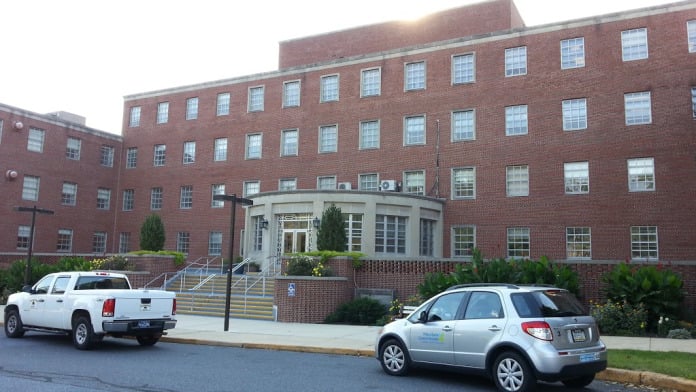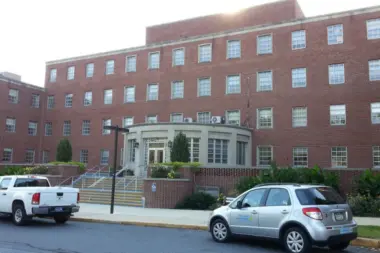About Wernersville State Hospital
Wernersville State Hospital has been in operation for over 125 years and is located on a sprawling campus near the Texter Mountain Preserve on Main Street in Wernersville, Pennsylvania. If you are seeking treatment for psychiatric and mental health disorders, Wernersville also provides services for substance use and alcohol dependency issues.
Referrals Through Single County Authorities (SCAs)
You may find it helpful to know that when seeking treatment at Wernersville, substance use treatment is referred through single county authorities (SCAs) and not self-referrals. They’re the point person for you to provide assessment of your needs, help with funding for your services, and coordination for referrals to help you with recovery. You’re also assigned a personal treatment team when you are admitted, ensuring you receive customized care for your needs.
Center of Excellence for Opioid Addiction Treatment
Wernersville is also considered a “Center of Excellence.” They work with community members to locate those among the community, who have found themselves addicted to opioids and provide them with assistance to live healthier lifestyles. If you are seeking care for opioid addiction, Wernersville will provide you with the right mental health and wellness services to get you back on your feet.
Promise-Based Services Through Peer Groups and Outreach
It is also reassuring to know that Wernersville is run by the Pennsylvania Department of Human Services’ Office of Mental Health and Substance Abuse Services (OMHSAS). Their promise-based services offer support through peer groups, therapy and outreach programs, including some in Spanish. I think it’s awesome they have unusual offerings, like music appreciation, fitness, and even smoking cessation classes.
The center also assists in securing employment opportunities, and family therapy to help your family cope with the relational side of addiction and mental health issues. Clients can learn computer literacy and beef up their communication skills as they look for work.
Facility Overview
Latest Reviews
Rehab Score
Gallery


Accepted Insurance
Other Forms of Payment
Private insurance refers to any kind of healthcare coverage that isn't from the state or federal government. This includes individual and family plans offered by an employer or purchased from the Insurance Marketplace. Every plan will have different requirements and out of pocket costs so be sure to get the full details before you start treatment.
Self-pay involves paying for treatment out of your own pocket. You can use savings or credit, get a personal loan, or receive help from family and friends to fund your treatment. If you don't have insurance or your insurance plan doesn't cover a specific program, self-pay can help ensure you still get the care you need.
Medicare is a federal program that provides health insurance for those 65 and older. It also serves people under 65 with chronic and disabling health challenges. To use Medicare for addiction treatment you need to find a program that accepts Medicare and is in network with your plan. Out of pocket costs and preauthorization requirements vary, so always check with your provider.
Medicaid is a state based program that helps lower-income individuals and families pay for healthcare. Medicaid covers addiction treatment so those enrolled can use their coverage to pay for rehab. When a program accepts Medicaid the client often pays very little or nothing out of their own pocket.
Addiction Treatments
Levels of Care
Residential treatment programs are those that offer housing and meals in addition to substance abuse treatment. Rehab facilities that offer residential treatment allow patients to focus solely on recovery, in an environment totally separate from their lives. Some rehab centers specialize in short-term residential treatment (a few days to a week or two), while others solely provide treatment on a long-term basis (several weeks to months). Some offer both, and tailor treatment to the patient's individual requirements.
Treatments
Many of those suffering from addiction also suffer from mental or emotional illnesses like schizophrenia, bipolar disorder, depression, or anxiety disorders. Rehab and other substance abuse facilities treating those with a dual diagnosis or co-occurring disorder administer psychiatric treatment to address the person's mental health issue in addition to drug and alcohol rehabilitation.
Mental health rehabs focus on helping individuals recover from mental illnesses like bipolar disorder, clinical depression, anxiety disorders, schizophrenia, and more. Mental health professionals at these facilities are trained to understand and treat mental health issues, both in individual and group settings.
Programs
Adult rehab programs include therapies tailored to each client's specific needs, goals, and recovery progress. They are tailored to the specific challenges adult clients may face, including family and work pressures and commitments. From inpatient and residential treatment to various levels of outpatient services, there are many options available. Some facilities also help adults work through co-occurring conditions, like anxiety, that can accompany addiction.
Young adulthood can be an exciting, yet difficult, time of transition. Individuals in their late teens to mid-20s face unique stressors related to school, jobs, families, and social circles, which can lead to a rise in substance use. Rehab centers with dedicated young adult programs will include activities and amenities that cater to this age group, with an emphasis on specialized counseling, peer socialization, and ongoing aftercare.
Clinical Services
Dialectical Behavior Therapy (DBT) is a modified form of Cognitive Behavioral Therapy (CBT), a treatment designed to help people understand and ultimately affect the relationship between their thoughts, feelings, and behaviors. DBT is often used for individuals who struggle with self-harm behaviors, such as self-mutilation (cutting) and suicidal thoughts, urges, or attempts. It has been proven clinically effective for those who struggle with out-of-control emotions and mental health illnesses like Borderline Personality Disorder.
Amenities
-
Residential Setting
Accreditations

State Licenses are permits issued by government agencies that allow rehab organizations to conduct business legally within a certain geographical area. Typically, the kind of program a rehab facility offers, along with its physical location, determines which licenses are required to operate legally.
State License: Pennsylvania
Contact Information
160 Main Street
Wernersville, PA 19565





